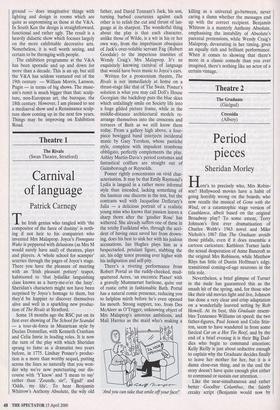Theatre 1
The Rivals (Swan Theatre, Stratford)
Carnival of language
Patrick Carnegy
The Irish genius who tangled with 'the compositor of the farce of dustiny' is noth- ing if not heir to his compatriot who invented Mrs Malaprop. Joyce's Finnegans Wake is peppered with delusions (as Mrs M would surely have said) of theatres, plays and players. A 'whole school for scamper' scurries through the pages of Joyce's stage. There you have the pleasure of meeting with an `Irish pleasant pottery' teapot, habituated to `that lydialike languishing class known as a hurry-me-o'er the hazy'. Sheridan's characters might not have been surprised by Joyce's homage to them, but they'd be happier to discover themselves alive and well in a sparkling new produc- tion of The Rivals at Stratford.
Some 18 months ago the RSC put on its first ever showing of The School for Scandal — a tour-de-force in Mozartean style by Declan Donnellan, with Kenneth Cranham and Celia Imrie in leading roles. It is now the turn of the play with which Sheridan sprang to fame as a dramatist two years before, in 1775. Lindsay Posner's produc- tion is a more than worthy sequel, putting across the lines so naturally that you won- der why we're now punctuating our dis- course with 'Y'know' and 'I mean to say' rather than `Zounds, sir!', 'Egad!' and 'Odds, my life'. To hear Benjamin Whitrow's Anthony Absolute, the wily old father, and David Tennant's Jack, his son, turning barbed courtesies against each other is to relish the cut and thrust of lan- guage at its sharpest. The wonderful thing about the play is that each character, unlike those of Wilde, is a wit in his or her own way, from the impertinent obsequies of Jack's over-voluble servant Fag (Robert Goodale) to the imperious inanities of Wendy Craig's Mrs Malaprop. It's an exquisitely knowing carnival of language that would have been music to Joyce's ears.
Written for a proscenium theatre, The Rivals is not immediately at home on a thrust-stage like that of The Swan. Posner's solution is what you may call Doll's House Georgian: the backdrop puts the blue skies which unfailingly smile on Society life into a huge gilded picture frame, while in the middle-distance architectural models re- arrange themselves into the crescents and terraces of Bath as we still know them today. From a gallery high above, a four- piece bewigged band interjects incidental music by Gary Yershon, whose pastiche style, complete with impudent trombone obbligato, perfectly complements the play. Ashley Martin-Davis's period costumes and fantastical coiffure are straight out of Gainsborough or Reynolds.
Posner rightly concentrates on vivid char- acterisation. It may be that Emily Raymond's Lydia is languid in a rather more informal style than intended, lacking something of the hauteur one discerns in the text, but she contrasts well with Jacqueline Defferary's Julia — a delicious portrait of a realistic young miss who knows that passion leaves a sharp thorn after the 'gaudier Rose' has withered. She already suffers one of these in the tetchy Faulldand who, through the acci- dent of having once saved her from drown- ing, does his best to sink her with his jealous accusations. Ian Hughes plays him as a bespectacled, petulant figure, stabbing the air, his edgy tenor pressing ever higher with his indignation and self-pity.
There's a riveting performance from Robert Portal as the ruddy-cheeked, mud- spattered Acres, 'an excentric Planet' with a gravelly Mummerset baritone, quite out of rustic orbit in fashionable Bath. Portal has a natural comic presence, reducing you to helpless mirth before he's even opened his mouth. Strong support, too, from Des McAleer as O'Trigger, unknowing object of Mrs Malaprop's amorous ambitions, and Mali Harries as the maid who's making a And you can take that smile off your face!' killing as a universal go-between, never caring a damn whether the messages end up with the correct recipient. Benjamin Whitrow is a masterly Anthony Absolute, emphasising the instability of Absolute's parental pretensions, while Wendy Craig's Malaprop, devastating in her timing, gives an equally rich and brilliant performance. When it comes to showing that there's more in a classic comedy than you ever imagined, there's nothing like an actor of a certain vintage.


































































 Previous page
Previous page